My friends, this little white ball is on its way to becoming Palitaw.
Palitaw is the weirdest and most addicting little snack that I’ve probably ever had. I say that about all of these recipes, don’t I? About the addicting part? But really, this one is. Truly.
Palitaw is actually glutinous rice flour and water mixed into a dough, rolled into balls, boiled until they’re soft and kind of chewy, and rolled in coconut and sugar. And if you’re having a party, you decorate them with colored sugar or food coloring and put ’em on a stick, because food on a stick = party.
This was another recipe that was supposed to be a “lesson” with my students where I’d bring them into the kitchen and they’d learn infinite amounts of math and reading by using a written recipe and halving the fractions. What ensued was more like a lesson for me in 1) how most Filipinos actually cook, which is without a recipe; 2) the wonders of glutinous rice flour; and 3) how to dab the sweat off your forehead with a paper towel in one hand while simultaneously popping another palitaw bite into your mouth with the other.
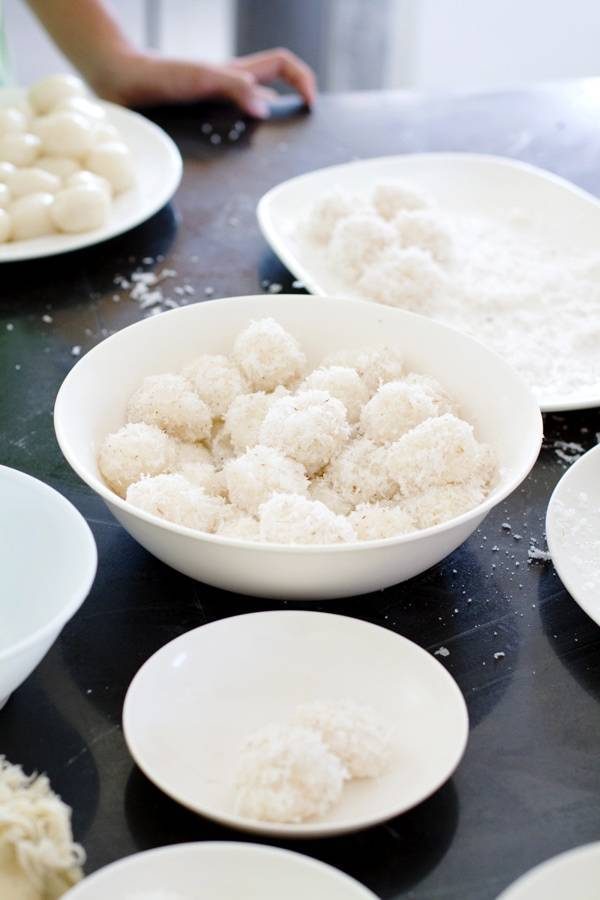
I have this vivid memory of being hotter (as in scorchingly hotter) than humanly possible and trying to help my students make sense of writing this recipe all while sneaking one after another of these little coconut rice flour gooey balls into my mouth. “Yes, students, that’s the correct spelling of Palitaw.” *chomp chomp* “Mmhm, a half cup.” *chomp*
I mean, you’re done making them before you’ve basically even started, so pop. Into the mouth they go. Served warm and soft with FRESH coconut (I mean, literally, there’s a tree right out there and one of the uncles just grabbed a coconut from it) and sugar stuck to the outside? These are the kinds of foods I miss.
Long live Filipino snacks. ♥
Here’s the rest of the story in pictures.
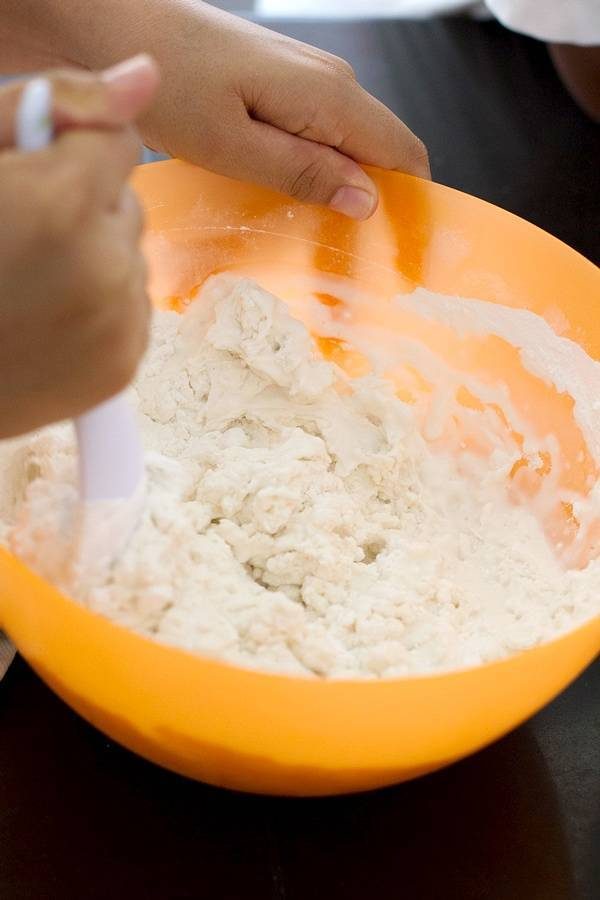
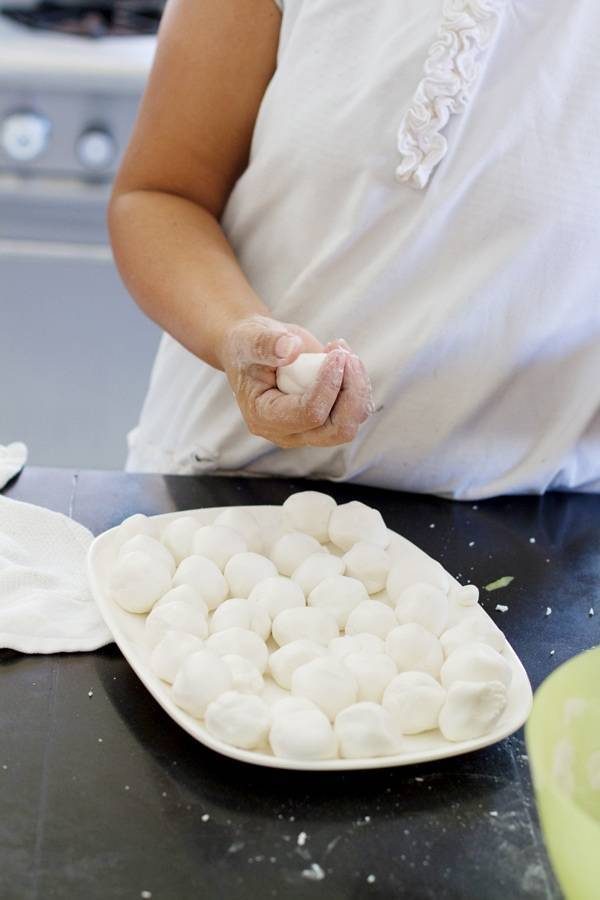
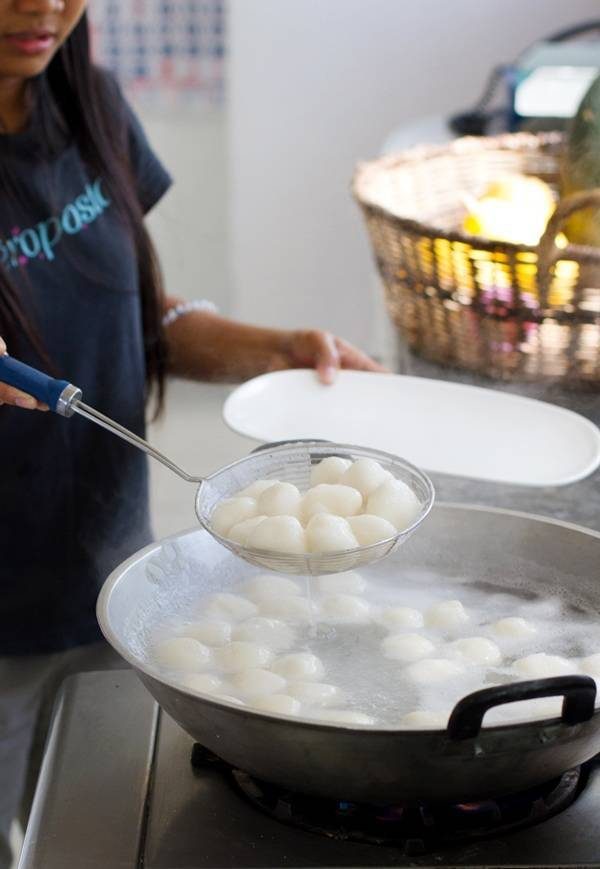
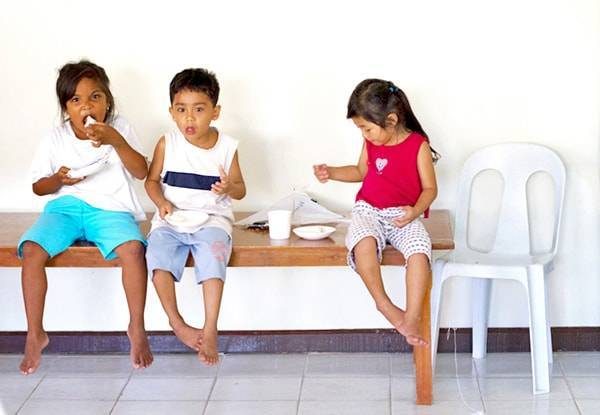

Palitaw
- Total Time: 20 minutes
- Yield: 20 1x
Description
This is recipe for coconut and sugar coated Filipino palitaw from the orphanage in the Philippines where I lived and worked for a year.
Ingredients
- 4 1/2 cups glutinous rice flour
- 2 cups water
- sugar for dusting
- shredded coconut for dusting
Instructions
- Mix the glutinous rice flour with the water until a thick, sticky mixture forms. Roll into small balls.
- Bring a large pot of water to boil. Add the glutinous rice balls and boil until solid and floating to the top, about 10 minutes. Drain the water and let the palitaw cool slightly.
- When cool enough to handle, roll in a bowl of sugar and coconut. Serve plain or on skewers. In my opinion, these are best while they’re still hot. For a fun twist, try adding food coloring to the dough or topping with colored sugar.
- Prep Time: 10 mins
- Cook Time: 10 mins
- Category: Dessert
- Cuisine: Filipino
Keywords: palitaw, filipino dessert, coconut and sugar
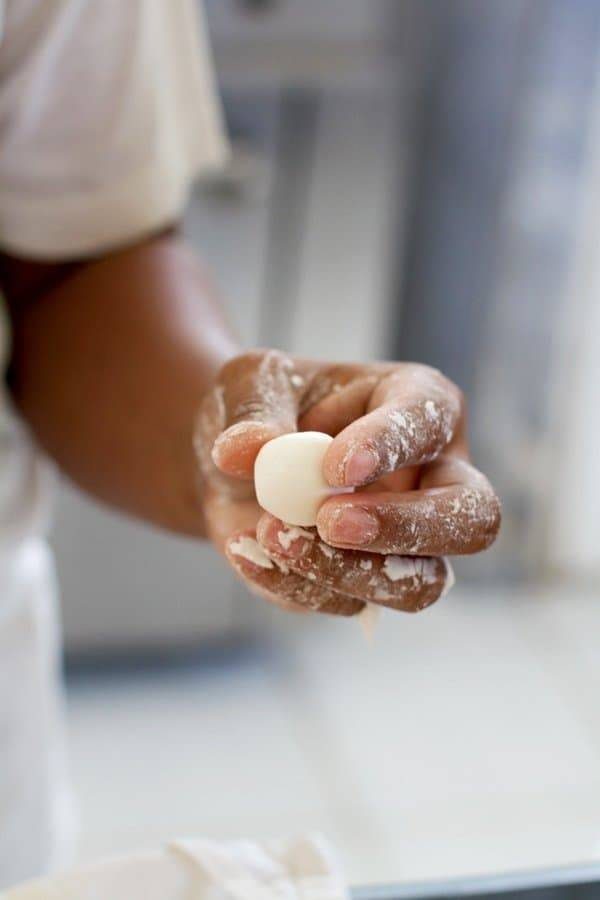


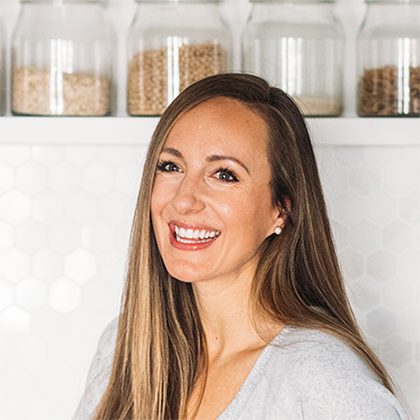



These snacks look delicious and I just love learning about other cultures. It must be great to have a coconut tree right outside!
nice recipe love it
It seems delicious, I will give it a try! I can definitely remember the coconut trees everywhere in Phillipines; fresh coconuts at any time of the day was one of my favorite things there 😉
This just brought back some great memories! My family is Thai, and this reminds me of several Thai desserts. In Thailand, they general boil these in a mixture of coconut milk and some sugar and it becomes a hot dessert served like a soup. But I like the idea of having it cooled and rolling it in sugar and coconuts!
Sounds amazing!
we boil glutinous rice balls in coconut milk in the Philippines too, but that’s a different snack altogether. We call them bilo-bilo, and we serve it like you do, how like a sweet soup. We usually boil yams, tapioca pearls, and Saba bananas with the bilo-bilo.
Please ignore my lousy autocorrect.
*We boil (my capitalisation was removed)
*hot like a sweet soup
Thanks for the recipe..
I will try this recipe ..
What a unique recipe! They look delicious and something I think my children would enjoy. Thanks for sharing and I hope you have a wonderful weekend~
I love your Filipino snack recipes! Fresh coconut shreds sound amazing!
I really enjoy these posts and learning about traditional Filipino cooking from your perspective – especially now that you’re back and writing about what you’re missing. I just might have to try these. And Palitaw sounds a whole lot better than Glutinous Rice Balls.
These look great! I’m normally picky about my coconut- ixnay on the prebagged, dried kind, and yes to the fresh stuff. I’ve never even heard of palitaw but they sound great- and you’re right, addictive. I wouldn’t be able to stop myself from sneaking them!
When I was in elementary school, my father was stationed at Subic Bay. We lived in military housing and had several coconut trees and a huge mango tree in our yard. My uncle Roland would come from Manila and spend the summers with us – I used to get such a kick out of watching him climb the trees and pick all that delicious fruit. I remember sitting in the grass munching on fresh coconut and mango … and then my mama hosing us down on the back porch because we were sticky from head to toe 🙂
Aha! I had these in Malaysia and had no idea what they were called (or what they really were), just that they were really tasty! We bought some from a street stall where a woman was making them fresh. Very cool that you’ve given us the recipe.
That last photo with the kids is SO cute! And I can definitely see why these can be deemed addicting.
These DO look addicting! My kids would so be into them. And I’m not sure any would be saved for later. . . .
Yum! This sounds great!
What an interesting idea!
Have you rolled the rice flour balls in cocoa? cinnamon? Just curious…
Nope, but I’m liking where this is going… 🙂
I’ve had a Korean version with ground sesame seeds, brown sugar, and cinnamon as the coating. Oh yes.
Love the post Lindsay!
The Palitaw I’m familiar with from family parties & filipino bakeries here in California are flattened discs not balls. First time seeing it ball shaped. But yeah…very yummy.
Interesting! never saw them like that in Cebu. Thanks for the comment!
It’s called palitaw because it floats (litaw – Tagalog word for to appear) when it’s done cooking in the boiling water. Traditionally, it does get flattened into discs, then you dip it in a mixture of white sugar, toasted sesame seeds, and shredded coconut. 🙂
I love these and make them all the time! Learned it from my mother who is also from Cebu! My boyfriend a surgeon just returned from a mission in the Philippines (Bulacan) where he donated his own time and money to do surgeries for three weeks straight! Love your blog!
It’s like a dessert dumpling. I’ll pin it and try it sometime! Thanks for sharing this.
These are some of my favorite post. The photos always make me smile and the recipes are always kind of awesome! The rice balls with fresh coconut sound amazing!
I just love the spunky girl on the left! 🙂
You would have adored those girls. Well, I guess anyone would, really. 🙂 I miss them.
Where do you buy glutinous rice flour… at a chain grocery store or a specialty store?
They are found in Asian store.
Yep, most Asian grocery stores carry it.
You can probably grind up your own flour from glutinous rice but the bagged ones sure are handy.
“Litaw” the noun means visible and the verb means (imprecisely) to pop up/show up suddenly/float. And you know palitaw is cooked when it floats to the surface.
I’m also more used to the flat, oval palitaws than balls. I like the flat shape better since you get more fresh, shredded coconut, white sugar and toasted sesame seeds that way. Glutinous rice balls are more common in the snack called “ginataang bilo-bilo” or glutinous rice balls in coconut cream (usually with jackfruit, sweet potato, saba bananas, tapioca balls).
I love all things glutinous rice (also makes it a gluten free treat)- and love how easy these sound to make. Definitely going to be trying them out
This is one of my favorite Filipino snack. Unfortunately, we do not make this as often as we have to here in the US , because we want to dust it with freshly shredded coconut and we cannot find it here in the US.
Thanks for sharing some of our Filipino foods.
In Indonesia they put a little piece of palmsugar inside the ball (which melts while boiling, supernice), they call it kelopon 🙂 oh, and they mix the flour with coconutmilk instead of water, I think.
Love the pictures! We have a similar Korean snack – it’s also incredibly addicting!
Yes, these are truly addicting. When I was a kid, we usually wait for the street vendor to come to our house so we can buy these snacks. I think it’s that sugar and coconut coating that makes you want some more!
FYI, “Palitaw” comes from the root word, “litaw”, which means, “to appear”. Once you put the balls into the boiling water, you wait for them to float and “appear” (litaw) on the surface. That means it’s done cooking! 🙂
Yes! thanks Pepin!
I am addicted to Mochi which seems similar to this except palitaw seems a million times better since it is rolled in coconut! YUM!
Yes! Love mochi!